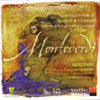Monteverdi Combattimento di Tancredi e Clorinda; Madrigals
Beautifully recorded and immediate but lacking in true tonal refinement
View record and artist detailsRecord and Artist Details
Composer or Director: Claudio Monteverdi
Label: Zig-Zag Territoires
Magazine Review Date: 7/2006
Media Format: CD or Download
Media Runtime: 57
Mastering:
Stereo
Catalogue Number: ZZT051003

Tracks:
| Composition | Artist Credit |
|---|---|
| Madrigals, Book 7 (Concerto: settimo libro de madr, Movement: Interotte speranze (wds. Guarini) |
Claudio Monteverdi, Composer
Akademia Claudio Monteverdi, Composer Françoise Lasserre, Conductor Jan van Elsacker, Tenor |
| Madrigals, Book 8 (Madrigali guerrieri et amorosi., Movement: Altri canti d'amor |
Claudio Monteverdi, Composer
Akademia Claudio Monteverdi, Composer Françoise Lasserre, Conductor Guillemette Laurens, Mezzo soprano Jan van Elsacker, Tenor |
| Madrigals, Book 8 (Madrigali guerrieri et amorosi., Movement: Non havea Febo ancora (lamento della ninfa) |
Claudio Monteverdi, Composer
Akademia Claudio Monteverdi, Composer Françoise Lasserre, Conductor Jan van Elsacker, Tenor |
| Madrigals, Book 8 (Madrigali guerrieri et amorosi., Movement: Hor ch'el ciel e la terra (wds. Petrarch) |
Claudio Monteverdi, Composer
Akademia Claudio Monteverdi, Composer Françoise Lasserre, Conductor Guillemette Laurens, Mezzo soprano Jan van Elsacker, Tenor |
| Madrigals, Book 7 (Concerto: settimo libro de madr, Movement: Con che soavita (wds. Guarini) |
Claudio Monteverdi, Composer
Akademia Claudio Monteverdi, Composer Françoise Lasserre, Conductor Guillemette Laurens, Mezzo soprano |
| (Il) Combattimento di Tancredi e Clorinda |
Claudio Monteverdi, Composer
Akademia Claudio Monteverdi, Composer Françoise Lasserre, Conductor Guillemette Laurens, Mezzo soprano Jan van Elsacker, Tenor |
Author: Jonathan Freeman-Attwood
Monteverdi’s theatrical ‘late’ madrigals rely on an alliance between accomplished vocal executancy, dramatic flair and textural coloration: the great ‘Baroque’ shift from antiquated contrapuntal abstraction towards the power of rhetoric and operatic representation. This opulently produced disc especially celebrates the grand scale and luminous collage of voices and instruments which make these seven ‘scenas’ leap from the page. Françoise Lasserre’s Akadêmia resonate generously in Eglise Notre Dame du Liban (Paris) in performances ripe with conviction.
What is achieved in corporate elegance, however, is not comparable, certainly, to the best indigenous groups like Concerto Italiano, where rhythmic timing of the concitato idiom (delivering the action with excitement) and the balance of dramatic and lyrical moment is far more sophisticated. Part of the problem in all the large ensemble pieces here is that Akadêmia’s deliberate declamation is not matched by a discerning ear for intonation or true tonal refinement. Even so, the fine recorded sound brilliantly captures the juxtaposed fanfares and homophonic asides of Altri canti di Marte, a remarkable madrigal where the longings of love ironically render the generic warmongering gestures as mere posturing.
Five of the seven works are taken from Monteverdi’s Eighth Book of Madrigals from 1638 (the other two from the previous publication of 1619), of which the set-piece Combattimento di Tancredi e Clorinda arguably makes the greatest demands – a 20-minute masterpiece portraying the poignant tale of the Christian Knight’s killing of a Saracen warrior only to realise that he’s killed his lover in disguise – has all the spittle and special effects of Alessandrini’s crossed swords but none of his expressive subtlety, variety and restraint. Throughout, I kept yearning for Concerto Italiano’s kaleidoscopic and pathos-laden solutions. A guarded recommendation for Akadêmia, for all its freshness and immediacy.
What is achieved in corporate elegance, however, is not comparable, certainly, to the best indigenous groups like Concerto Italiano, where rhythmic timing of the concitato idiom (delivering the action with excitement) and the balance of dramatic and lyrical moment is far more sophisticated. Part of the problem in all the large ensemble pieces here is that Akadêmia’s deliberate declamation is not matched by a discerning ear for intonation or true tonal refinement. Even so, the fine recorded sound brilliantly captures the juxtaposed fanfares and homophonic asides of Altri canti di Marte, a remarkable madrigal where the longings of love ironically render the generic warmongering gestures as mere posturing.
Five of the seven works are taken from Monteverdi’s Eighth Book of Madrigals from 1638 (the other two from the previous publication of 1619), of which the set-piece Combattimento di Tancredi e Clorinda arguably makes the greatest demands – a 20-minute masterpiece portraying the poignant tale of the Christian Knight’s killing of a Saracen warrior only to realise that he’s killed his lover in disguise – has all the spittle and special effects of Alessandrini’s crossed swords but none of his expressive subtlety, variety and restraint. Throughout, I kept yearning for Concerto Italiano’s kaleidoscopic and pathos-laden solutions. A guarded recommendation for Akadêmia, for all its freshness and immediacy.
Discover the world's largest classical music catalogue with Presto Music.

Gramophone Digital Club
- Digital Edition
- Digital Archive
- Reviews Database
- Full website access
From £8.75 / month
Subscribe
Gramophone Full Club
- Print Edition
- Digital Edition
- Digital Archive
- Reviews Database
- Full website access
From £11.00 / month
Subscribe
If you are a library, university or other organisation that would be interested in an institutional subscription to Gramophone please click here for further information.




